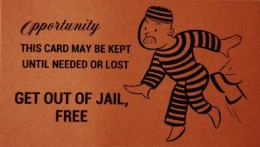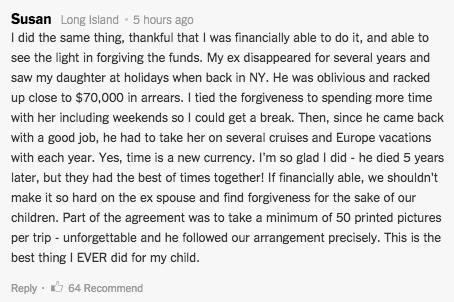Forgiving Is Not Forgetting: On Letting Go Of Debts

What’s the biggest debt you have had to forgive? For Kimberly Seals Allers, the amount totaled almost $40,000, and her story is a moving one.
Studies prove that school-age children of involved fathers have better academic success, higher grade point averages and go on to have higher levels of economic and educational achievement. We focus on money, when “child support” also means emotional support, academic support and the supportive power of a male influence in a child’s life. Negating that value is dangerous to our children. Regardless of what I think of him, my children love their father and doing my part to keep that feeling alive is priceless to me.
As mothers we would never want our value to be trivialized to a dollar amount. But fathers are often reduced to being an accessory parent — nice to have around, but not essential as long as a good mother stands in. In the seven years since my divorce, my ex-husband (or “wasband” as I like to call him) has always given our children his time, whether he had money or not. He currently makes payments to me directly when he is able.
But his arrears have accumulated during years when he was unemployed or underemployed and either paid less than the monthly payment ($600) granted when we divorced, or nothing at all. So when our children were young, after our separation and early in our divorce, I negotiated new currencies such as additional time when I needed child care, meal preparation, haircuts and even helping with home repairs, instead of acting as if a cash payment was all he had to offer our children. The look on their faces when he came to pick them up was more than worth it.
Because Allers’s “wasband” couldn’t pay minimums and was in arrears, he wasn’t able to travel back to the US to come to one of the children’s graduations. That was what inspired Allers to say that enough was enough: “I view him as having been unable to pay, not unwilling. But our broken system lumps both kinds of fathers together in the same prison-bound barrel.”
She felt financially able to release him, and she did, for the good of the family as a whole.
A commenter named Susan made the same choice and doesn’t regret it.

Divorce often brings out the worst in people. Remember the tagline of the women’s empowerment comedy The First Wives Club, as delivered by Ivana Trump? “Don’t get mad; get everything!” But when there are children involved especially, big-picture justice is about more than getting every penny that is owed to you. What looks like justice can be little more than vengeance, and it can ruin an ordinary person’s life: consider, for example, Walter Scott, the North Charleston man shot and killed this month when he ran from a cop.
On April 4, he was pulled over for a broken taillight, fled on foot and, after a scuffle with a police officer, was fatally shot in the back.
The warrant, the threat of another stay behind bars and the potential loss of yet another job caused him to run, a brother, Rodney Scott, said.
“Every job he has had, he has gotten fired from because he went to jail because he was locked up for child support,” said Mr. Scott, whose brother was working as a forklift operator when he died. “He got to the point where he felt like it defeated the purpose.”
The idea behind child support is sound. Society has a vested interest in making sure children get the financial backing of both parents, if that’s at all possible. We don’t make it easy for mothers to work and raise kids in this country even in couples, let alone as sole caregivers. And after divorce, on average, a woman’s financial situation worsens while a man’s improves. (“The wife’s standard of living may drop almost 27 percent while the husband’s may increase by as much as 10 percent.”)
It’s a problem though when, as the Times reports, “the vast majority of unpaid child support is owed by the very poor” and we use their poverty as yet another reason to incarcerate young men. Jail is our default, the hammer that turns every subtle and complex problem into a nail. We need a better and more compassionate system, one that values fairness as well as good intentions, and one that prioritizes the broader needs of the family rather than our desire to single out individuals for punishment.
Support The Billfold
The Billfold continues to exist thanks to support from our readers. Help us continue to do our work by making a monthly pledge on Patreon or a one-time-only contribution through PayPal.
Comments